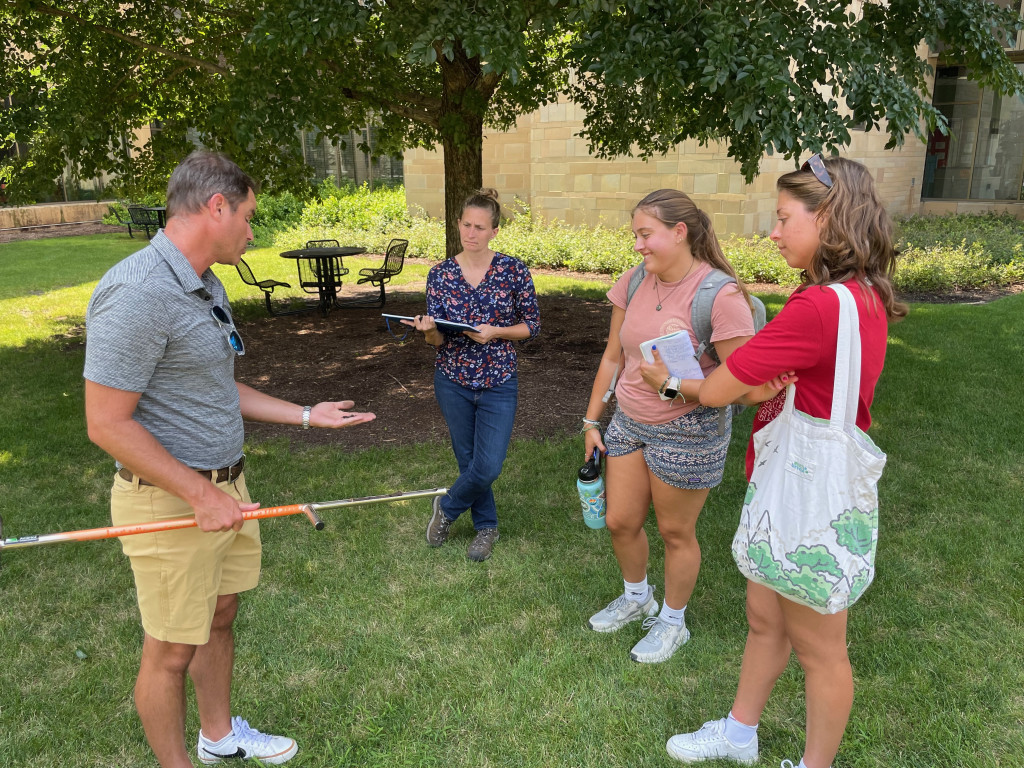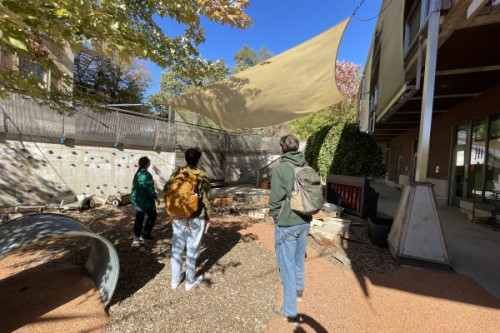The Green Fund: How UW–Madison students are driving a global sustainability effort

Students collaborated with Grounds and Campus Planning and Landscape Architecture to pilot organic landscape management practices, using compost and other organic inputs rather than synthetic fertilizers and pesticides on four campus landscape sites.
Editor’s note: Abigail Bures is a UW–Madison student and intern for the Office of Strategic Communication.
Students at the University of Wisconsin–Madison are often the first to notice opportunities to improve the sustainability of campus facilities. However, many don’t have the resources necessary to solve the problem on their own.
This is why the UW Office of Sustainability created the Green Fund program. It supports student-initiated projects that improve the environmental footprint and social impact of campus.
“The Green Fund is the main source of funding for our projects,” said Owen Knych, a junior at UW–Madison and the president of Engineers for a Sustainable World. “Over the past three years, we have completed or are actively working on ten different Green Fund projects … everything from Solar Little Free Libraries, bee hotels, aquaponic and hydroponics systems and rainwater catchment systems.”
ESW is an engineering-based registered student organization with 30-40 members who design projects on campus and in the Madison area. Their goal is to create a lasting local impact.
Students bring their proposals to the Green Fund staff and receive support as they turn their ideas into tangible projects. Staff assist in helping students meet with campus stakeholders, collect and analyze data, write funding proposals, implement the project and tell the story about the outcomes.
Knych said, “By funding ESW projects, the Green Fund has provided me with too many things to count: engineering design, grant writing, client communication, leadership, cross-disciplinary collaboration and amazing friendships.”
Program manager Ian Aley stressed the importance of the Green Fund’s guidance in addition to the grants. “The Green Fund offers money to implement these projects, but just as importantly, we facilitate hands-on learning for students.”
Reclaimed sails to provide shade
Knych is currently working on a zero-waste shade sail for the Allen Centennial Garden. To build it, Knych said they are using four reclaimed wood posts and two old sailboat sails provided by Hoofers Sailing.
Knych said the goal was to, “[allow] toddlers from the Childhood Development Lab, elementary and middle school students on field trips and garden visitors a relief from the sun.”

Students from Engineers for a Sustainable World designing a shade structure that reuses sails from Hoofers sailboats, supporting the UW’s Zero Waste efforts and Allen Centennial Garden’s outdoor education programming.
Since the Green Fund launched in the spring of 2017, it has supported many successful student-led sustainability initiatives. Aley said the program received 15 applications this year, which is the highest number ever.
“We approve most applications we receive,” said Aley. “If an idea isn’t ready right away, we offer feedback and continue to support the student team until it is ready for approval.”
A more unusual project popped up for the Green Fund in 2022, when the UW grounds crew approached Office of Sustainability staff about changing out seven of their fossil-fuel-powered riding lawn mowers for electric ones.
Green Fund staff invited Campus Leaders For Energy Action Now (CLEAN), a student group organized around sustainability on campus, to collaborate on the project.
Aley supported CLEAN students in calculating the cost savings and carbon impact of the conversion to electric. Through the Green Fund process, students conducted interviews with the operators of the mowers to hear about their experiences running and maintaining the mowers.
The result was success. “The bottom line was, for the operators, [the mowers] are great,” said Aley. “They prefer them to the diesel and gas mowers.” The suggestions and observations gathered during these interviews will inform future electrification efforts on campus.
Hannah Stahmann, a senior at UW–Madison, has been a part of three Green Fund projects, including the green mowers initiative.
Stahmann said these projects “have the opportunity to have impacts on a broader scale as well …. Both the electric lawnmower and B-Cycle projects reduce exposure to air pollution for pedestrians and Grounds workers.” Each Green Fund initiative also works towards UW’s campus-wide sustainability goals.
Wide range of projects
Other projects that the Green Fund has supported include installing bird-safe windows around campus, supporting infrastructure for waste reduction and compost collection in dining halls and bringing a B-Cycle station to the Arboretum Visitor Center to improve access.

Green Fund partners pose with bird-safe decals being installed at Dejope Residence Hall in May 2024. The decals feature a dot pattern designed to reduce bird collisions by breaking up reflections on the glass.
The Green Fund encourages student creativity and initiative and ensures that students have the right resources to bring their ideas to life, for the benefit of our campus community and beyond. Students who work with the Green Fund know that their impact will be felt long after they graduate.
Stahmann said, “The Green Fund has been and will continue to be a vital component in reaching our sustainability goals and fostering a culture of collaboration throughout the campus community.”
“The Green Fund is everything to me,” said Knych. “It has quite literally made my college experience.”
Tags: student life, sustainability




